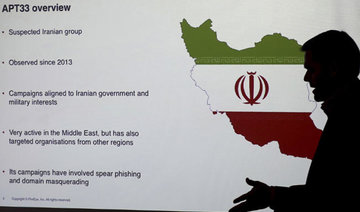DHAHRAN, Saudi Arabia: Cybersecurity is a worldwide phenomenon that represents a complicated challenge wherever technology is used. It affects governments, corporations, and individuals.
With continuous cybersecurity updates come new threats and challenges, and the need for awareness among technology users.
With rapid growth in technology in the Kingdom, mass awareness about cybersecurity must also increase.
Saudi Arabia experiences some 160,000 cyberattacks daily, according to the National Center for Cyber Security at King Abdul Aziz City for Science and Technology.
“Cybersecurity wasn’t really introduced widely in Saudi Arabia until recently,” Yousef Guzaiz, manager for information security governance, risk, and compliance at telecommunications company Mobily, told Arab News.
“According to a recent study by Gartner, the American research and advisory company focusing on IT and business, worldwide security spending is forecast to reach $96 billion in 2018. This tells you how severe the issue is,” he said.
“Everyone must always protect their personal private information (PPI). No one should ever share their personal information with anyone, including credit card details, because PPI can be leaked, misused and exploited for blackmail, fraud and theft,” he added.
 “Even if you have strong firewalls, the best intrusion-prevention systems, and the most effective antivirus and malware-detection solutions, a critical component is still missing from the cybersecurity chain: The human factor. The end-user attack can’t always be prevented because at the end of the day, the user is the weakest link in cybersecurity.”
“Even if you have strong firewalls, the best intrusion-prevention systems, and the most effective antivirus and malware-detection solutions, a critical component is still missing from the cybersecurity chain: The human factor. The end-user attack can’t always be prevented because at the end of the day, the user is the weakest link in cybersecurity.”
Alanood Al-Shehry, a member of the board of directors of the Saudi Federation for Cybersecurity and Programming, told Arab News that the federation “aims to play a pivotal role in this domain via multiple means, including organizing national and international events, providing educational and training courses, hosting national and international competitions, and conducting public lectures.”
The federation “strives to drive a positive change in behavior toward cybersecurity, and encourage the development of cybersecurity experts across the nation,” she added.
It provides services and membership opportunities to both corporations and individuals. “One of the federation’s main objectives is to bridge the gap between educational institutes and industry demands in cybersecurity and programing so corporations can more easily find individuals with the proper skillsets,” Al-Shehry said.
“The federation plans to organize various contests in cybersecurity and programing, and will help local talent participate in international contests,” she added.
“It will launch specialized educational and training initiatives that range from beginner courses to hands-on, highly specialized ones, along with conferences, workshops and other activities that explore the latest technologies in cybersecurity and programing.”
The federation strives to discover, attract and develop local talent at a young age, when “it’s easier to nurture their talents and enhance their abilities,” she said.















